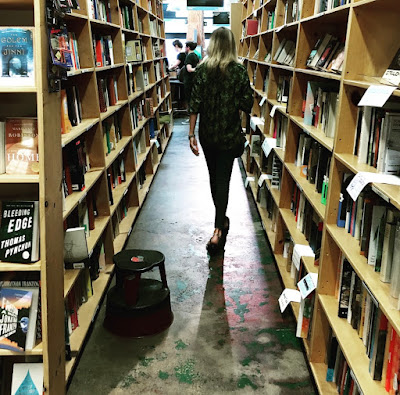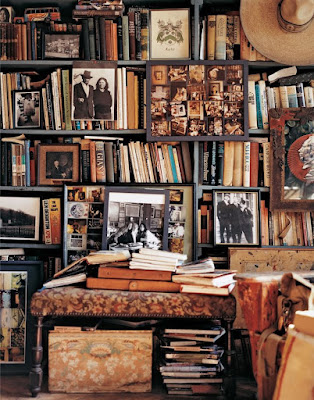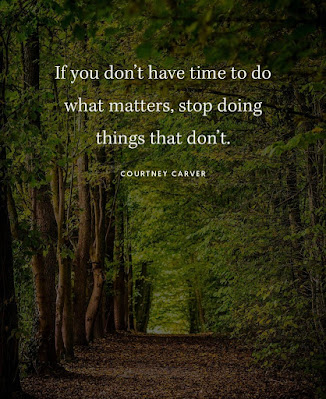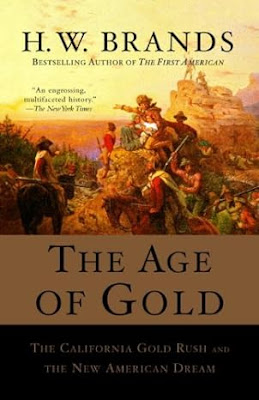 |
| Powell's Bookstore. |
As the rather morose but truthful verse from Ecclesiastes says, "What has been will be again, what has been done will be done again; there is nothing new under the sun (Ecc 1:9).
The thing about living in this world, particularly with trends and styles, is this: it all comes back around.
The '80s and '90s, which I lived through as a young girl are back today (and have been for a few years, judging by the vintage fashion I'm selling and the television ads I'm seeing).
From high-waisted denim for fashion to remade television shows of Magnum P.I. and Quantum Leap, it's as though entertainment and fashion can't seem to find something new to make, so they rework the old.
It's the same for interior design. My sister, as an interior designer, can attest to vintage trends coming back in style from the mid-century modern furniture design craze to brass bathroom fixtures of the 1980s.
It's all back in again - a cycle that has been with us for thousands of years. The high-waisted fashion of the '80s was loosely based on the high-waisted fashion of the '40s or before. It wasn't new in the '80s, even if we thought it was.
This recycling of ideas may be because folks are less creative (which I doubt) or because successful past creations incentivize directors, writers, and designers, to do it again. I mean, if it worked in the past, why not bring it back?
It's not a bad idea to bring back the past, especially if we learn from it. But, some ideas - like some fashion concepts - just need to stay in the past (think stirrup pants and '80s bangs.)
Regardless of why life is so cyclical, have you heard about the latest fad word "Bookshelf Wealth?" What is this crazy two-word description and why should we care?
It's quite easy to explain. It's about showing off your books; literally, it's about making you "appear" wealthy all from your books and the plethora of knickknacks that go with it. I love picture frames and knickknacks picked up from around the world but faux "well-traveled" interiors reek of inauthenticity.
You won't get beautifully curated bookshelves just by spending thirty minutes at Pier One Imports and picking up garage sale books. It takes time. Quality takes time.
So, why do we need trendy word descriptions to do what many of us have been doing for hundreds of years? Why does the media keep renaming things? (i.e. fanny packs, now called sling bags, belt bags, and waist bags.)
With Bookshelf Wealth, whether you've read said books on your shelves or not is irrelevant. What is relevant is making sure people think you are well-read and well-to-do all because of your vast collection of books... and stuff.
There's an air of inauthenticity about all of this. As well as consumerism. Both of which I'm not a fan of. What I do love is true good books, true art pieces picked up from travels, pottery and statues from counties visited, and bazaars and estate sales perused for pieces that define you.
That's authentic.
If you read and love books, you should have books. Hundreds of them (or in my case, a lot of my books on your Kindle.) If you don't read but have rows of bookshelves filled with volumes of things you've never read - or have no plan to read - what are they doing in your home?
And when this fad dies away with a new one in its place, where do those books go? Probably to the landfill. Or the overrun book section at the Goodwill.
Designer, Kailee Blalock from San Diego, who helped to trend this concept, said in an interview (an article that accentuates exactly how I feel) "I think to really achieve the look and the lifestyle, someone has to be an avid reader and has to appreciate the act of collecting things, especially art and sculpture."
Exactly. That is the whole concept. True bookshelf wealth takes time; it isn't a trend, but a slowly collected treasure trove of books read and details carefully curated.
 |
Again, my interior designer sister uses books with much of her interior decor design. And she has clients who want bookshelves. Great! I'm glad people out there love books and read them. (It's probably because they're bibliophiles though, not trendy hipsters.)
As with most things in my life, I'm trying to keep them simple. So here's the simple: If you like books, keep them, love them, and read them. Be the educated, cultured, inspirational, and creative person you are because of them. Books are worlds of exploration.
As a minimalist, I've pared down my books to two categories: books I love and books I'd want to read again. They're essentially the same thing but with two different actions behind them.
If you're not a book lover, don't waste your time on bookshelf wealth. It'll be a faded memory of a trend a few months from now.
But, if you are a book lover, forget about the term Bookshelf Wealth and carry on doing what you've always done: read because you love to and keep books because you can't live without them.
Happy reading.







